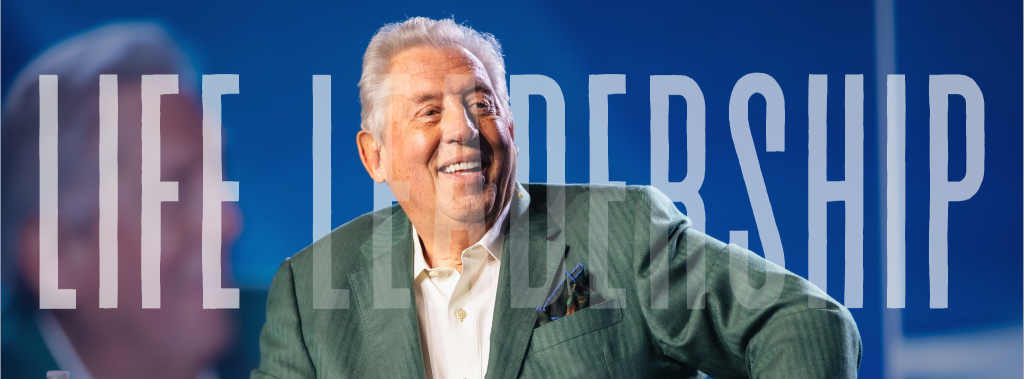5 Experiences We Must Offer to the Next Generation

I read about a father, Paul Wallich, who built a camera-mounted drone helicopter to follow his young son to the bus stop. He wanted to ensure his son arrived at the bus stop safe and sound. There is no doubt that gizmo provided some entertainment for everyone. For me, Paul Wallich gives new meaning to “helicopter parent.”
Today, I not only see a new generation of kids on our hands, I see a new generation of parents as well. While I applaud the engagement of these moms and dads, we’ve focused so much on safety, self-esteem and status, that our children can grow into adulthood unready for the hard knocks of life. Too often:
- We risk too little.
- We rescue too quickly.
- We rave too easily.
Over time, we fail to offer the rites of passages that former generations gave kids. I decided to do it differently. Since 1979, I’ve been committed to mentoring emerging leaders—both students and young professionals. I became a father in 1988 and now have two adult children. Over time, I identified the experiences that are the most meaningful ones to my mentees—the experiences that mature Generation Z kids as well as build grit and depth. Collectively, they serve as a sort of “rite of passage” for them. I invite you to consider inserting these experiences as you invest in your kids.
5 Experiences That Foster Maturity
1. DO SOMETHING SCARY.
There is something about stepping out of our comfort zones to attempt a risky act that’s unfamiliar and even a little frightening that makes us come alive. Our senses are heightened when we feel we are taking a risk. We don’t know what we’re doing; we have to trust and even rely on each other. Ideally, these initiatives are intentional and well-planned, but they should not be scripted. They must include the element of chance. As a mentor, I’ve taken my mentees downtown to spend the night with homeless people. Those students were wide-eyed as we interacted with an entirely different population of people and slept on trash bags with newspapers as a blanket. A small dose of “danger” mixed with a large dose of “unfamiliar” accelerates growth.
When my son was 12, he and I took a father and son trip to another city. We explored some new places, but the scariest part the four-day trip was when I traded places with him in our car and had him drive it around a parking lot. After explaining the gears and pedals, Jonathan overcame his panic and drove that big automobile. In moments, he was grinning from ear to ear. This sparked a remarkable conversation, comparing his fear to what he’ll experience becoming a man. Manhood is not for the fainthearted; it’s about responsibility—being “drivers,” not “passengers,” in life. Facing fears is a rite of passage for kids. Doing something that’s neither prescribed nor guaranteed unleashes adrenaline and other chemicals in our bodies that awaken us. Other “feel-good” chemicals also come into play with scary experiences, including dopamine, endorphins, serotonin and oxytocin. Part of the reason more teens don’t “come alive” is we’ve protected them from “high stakes” in the name of safety.
2. MAKE YOUR SEARCHES REDEMPTIVE, NOT JUST ENTERTAINING.
Another challenge for them to rise to is meeting someone they deem significant. Because Gen Z is less at home meeting adults face to face, the encounter itself stretches them. On top of that, meeting significant people invites them to prepare questions to ask and fosters listening skills as well. These can be famous people, but they don’t have to be. The key is they’re people the students believe to be important due to what they’ve accomplished. I was invited to participate in a special meeting in Washington D.C. when my daughter, Bethany, was just nine years old. Since I would be meeting congressmen, ambassadors and other civic leaders, I wanted her to experience it with me. Encountering noteworthy people can be intimidating, even to adults. It was fun to introduce her to these people and witness her interacting with them and eventually feeling quite at home.
For the first 20 years of my career, I worked for best-selling author John C. Maxwell. My kids were fortunate enough to build a relationship with John and his wife, Margaret. Interacting with the Maxwells enabled them to overcome social fears and to see noteworthy people as “human.” Today, my kids are not starstruck with celebrities and are comfortable interfacing with people of all ages.
3. TRAVEL SOMEPLACE DIFFERENT.
We all know that travel is an education in itself. While classrooms are useful learning contexts, leaving the classroom and all that’s familiar is better still. Not only does travel push kids out of their comfort zones, it forces them to work at understanding others, at connecting with new environments and at problem-solving, since those new contexts are places we cannot default to our subconscious. Consider this: when we’re in familiar situations, we can shift into “cruise control.” We can become numb to reality since we’re on our home turf. This doesn’t occur in a foreign location. Mission trips stir our curiosity, beg us to research, beckon us to learn and invite us to grow up. We think new thoughts in new places. My friend Glen Jackson says, “A change of pace plus a change of place equals a change of perspective.”
One of my favorite memories, however, was taking my 5-year-old daughter, Bethany, to Croatia, during the Serbian-Bosnian War, in 1993. My goal was to enable her to be comfortable in environments that were both foreign and struggling. Bethany helped to serve clothes, food and blankets to refugees who relocated to the area. She saw poverty she’d never seen before and experienced the joy of providing for the needs of those who were displaced and suffering. It was life-changing.
4. CHASE A MEANINGFUL GOAL.
I believe teens need for us to let them pursue an objective that has high stakes and give them full control. Past generations matured more effectively because they were given responsibility for jobs and goals that had genuine meaning at a young age. When we lower the stakes, or we give kids an artificial purpose to engage in, they end up with artificial maturity. While I believe in the value of academics, it’s still a facsimile of a meaningful world, created by our current, contemporary structures. I meet too many students who master the skill of getting a good grade, yet struggle to translate those grades into a career, to a marriage and to a family. Information is meaningful as it becomes application.
When I speak of chasing a big goal, I mean aiming for a target that has deep meaning to your child, one that stretches their capacity and is important. As a teen, my son told us he wanted to pursue the entertainment industry. So, my wife and I decided to let Jonathan step out at 16 years old. As a homeschooler, he had more freedom with his time. He and his mom moved from Atlanta to Los Angeles for seven months to try his hand at acting. The experience was revealing, as you can imagine. Life in Burbank at an apartment with hundreds of other kid actors revealed the highly competitive world there. He soon recognized that the real influencers are the storytellers behind the camera. Returning home, Jonathan was a different person—clearer about his calling. He earned a degree in screenwriting and now writes scripts every week.
5. WAIT AND WORK FOR SOMETHING YOU WANT.
One of the reasons teens and college students find “adulting” so challenging today is they’ve grown up in a world where almost everything is “instant access” and “on-demand.” It can coerce us to expect instant gratification. The opposite of this trait is patience and work ethic. These signal maturity because the person is able to see a goal in their mind that is still invisible externally.
Consider what’s happening in their brain. When a teen envisions an outcome before they actually experience it, it can cause the brain to release dopamine and endorphins, which signal pleasure and rewards. As teens experience learned industriousness (“I keep working because I know it will pay off”), acetylcholine kicks in. This chemical plays a vital role in learning and memory and it deepens neuropathways as kids associate rewards with working for a goal. In our home, our kids paid for half of their first car, half of their smartphone or half of a trip they each wanted to take in school.
My favorite outcome from all these experiences with my kids came years later. My daughter, Bethany, called me when she was 25 years old and living 2,000 miles away. When I asked why she called, she replied, “I guess I just called to say thanks.”
I said, “Well, every dad loves to hear that from his children—but what drove you to call me? Did something happen at work today?”
After collecting her thoughts, she blurted out, “I guess I just noticed that I work with a bunch of young professionals like me, but nobody sees the big picture around here. They act lazy, they’re on their phones, and I don’t see any work ethic. They’re not ready to live on their own!” Then, she paused and concluded, “I guess I just realized that you and mom did get me ready. And I just wanted to say thanks.”
Through tears, I smiled and replied, “Bethany—you just made my year.”
Looking for ways to empower and inspire personal growth and development in the next generation?
Speaker, author, and leadership expert Tim Elmore has devoted his life to developing leaders that add value to others both personally and professionally. As CEO of the non-profit organization Growing Leaders and in other roles of influence, he has been able to train more than 500,000 leaders in hundreds of organizations worldwide. He is also the world’s leading expert on the emerging generation and generational diversity. His new book, A New Kind of Diversity, seeks to close the generational gap and leverage differences among generations as strengths instead of weaknesses – pre-order your copy today.
Join Tim and John Maxwell for a day of discussing generational diversity!
On October 25 at 12 PM ET, Tim Elmore is hosting a book launch for A New Kind of Diversity. He’ll be joined by John Maxwell (and some other special guests!), so don’t miss out! Attendance is free and you can join here.
More Articles

3 Strategies for Less Stress and More Meaning This Holiday Season

6 Ways Great Leaders Can Cultivate Gratitude









Be the first to comment on "5 Experiences We Must Offer to the Next Generation"